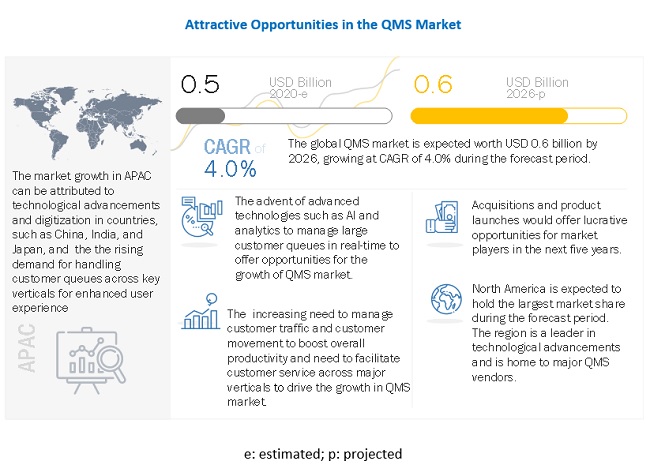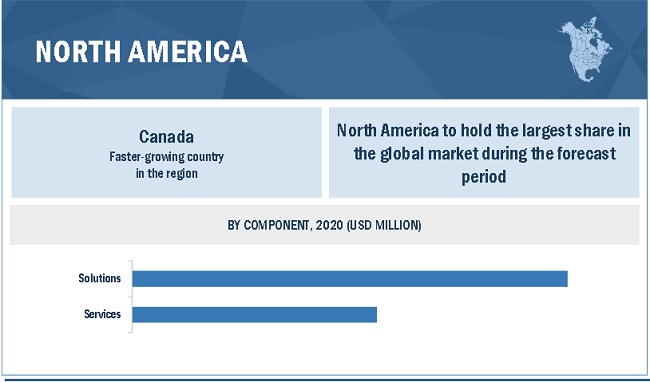< Key Hightlight >
The global queue management system(QMS) market size to grow from USD 0.5 billion in 2020 to USD 0.6 billion by 2026, at a Compound Annual Growth Rate (CAGR) of 4.0% during the forecast period. Factors such as the increasing need to manage customer traffic and customer movement to boost productivity and the rising need to improve staff efficiency and enhance customer engagement during COVID-19 are driving the adoption of the QMS market across the globe. QMS can be used at any location undergoing a significant footfall. Most of the organizations prefer QMS solutions and services to shorten on-site customer wait times and reduce walkaways.

To know about the assumptions considered for the study, Request for Free Sample Report
COVID-19 Impact on Global QMS Market
The queue management system market is expected to witness an insignificant slowdown in 2020 due to the global lockdown. The COVID-19 pandemic has increased the churn rate and shuddered almost every industry. The lockdown is impacting global manufacturing, and supply chains and logistics as the continuity of operations for various sectors is badly impacted. The sectors facing the greatest drawbacks are manufacturing, transportation and logistics, and retail and consumer goods. The availability of the essential items has been impacted due to the lack of manpower to work on production lines, supply chains, and transportation although the essential items are exempted from the lockdown. The condition is expected to come under control by early 2021 while the demand for QMS solutions and services is expected increase, which is due to the increased demand for enhanced customer experience and build a personalized relationship with the prospects. Several verticals are already planning to deploy a diverse array of QMS solutions and services to enable digital transformation initiatives, which address mission-critical processes, improve operations, and authenticate user’s identification. The reduction in operational costs, better customer experiences, fraud detection and prevention, enhanced authentication processes and operations, and improved real-time decision-making are the key business and operational priorities that are expected to drive the adoption of the QMS market.
Market Dynamics
Driver: Increasing need to manage customer traffic and customer movement to boost productivity
QMS is an automated system designed to manage walk-in services or customer flow. It is majorly used to manage interactions with the customers, whether it be in person or through information displayed over the screen. This system benefits organizations to manage and control queues of persons. It offers a range of modules that users can utilizes to efficiently handle customer requests. QMS allows a business to accurately understand where the inefficiencies are in their queues and to address these issues on a continual basis to ensure a consistently positive experience. The benefits of QMS can extend throughout the business from improving customer satisfaction to improving business productivity. According to a survey by VersionX, 78% of customers agree that they like to be in control of when they want to be serviced.
Restraint: High setup costs for queue management system
QMS are widely used in the public transportation network. The deployment of these across the network requires joint efforts from entities, such as infrastructure providers, component manufacturers, service providers, the public sector, and user groups. The involvement of various entities for the successful implementation of ticketing systems entails a sophisticated framework, which results in a huge amount of investments. Hence, the successful implementation of QMS requires a large amount of funding from authorities, and this may slow down the growth of this market. There will be high initial setup cost and ongoing premiums associated with QMS which may cause hindrance the growth of this market
Opportunity: Advent of advanced technologies such as artificial intelligence and analytics
The booming technological world is witnessing a rapid multiplication in the use of connected devices due to the proliferation of Artificial Intelligence (AI) and analytics trends. In the hospitality industry, these technologies have presented an opportunity to improve the security of visitors and guests and reduce the human workforce required to maintain protective measures. The growing adherence to regulatory compliances further leads to a rise in the demand for automated visitor management systems. AI and analytics technologies are playing a major role in driving the adoption of the global queue management system market. Analytics is a combination of storing and processing sensor data and computing using data analytics to achieve and assist in managing the customer queues effectively. With the advent to AI and analytics, large enterprises can now provide secure QMS solutions with various key features, such as online booking, smart callback system, self-service sign-in, performance tracking, and real-time alerts and notifications.
Challenge: Data safety and security issues
Data safety and security issues associated with the use of QMS are estimated to be one of the major challenges affecting the growth of the market. User data stored in smart cards or mobile devices can be misused. However, large enterprises are more concerned related to the safety and security of these automated QMS due to several safety issues and vulnerability. As per a survey conducted by IBM, several QMS have flaws and can be easily hacked or accessed by attackers. These attackers can further access kiosks easily and can break into underlying Operating Systems (OS), leading to the loss or theft of the organization’s sensitive information
Among verticals, the healthcare and life sciences segment to grow at the highest CAGR during the forecast period
The global QMS market is segmented into the various verticals, particularly verticals, such as government and public sector, BFSI, retail and consumer goods, healthcare and life sciences, IT and telecom, travel and hospitality, utilities, and other verticals (education, manufacturing, and media and entertainment). The healthcare and life sciences vertical is expected to grow at the highest CAGR during the forecast period. Ease of handling patient query and enhance productivity to drive the demand for QMS solutions across the healthcare and life sciences vertical across the world.
APAC to grow at a higher CAGR during the forecast period
The global queue management system market has been segmented into five regions: North America, Europe, APAC, MEA, and Latin America. In terms of market size, North America is estimated to hold the largest size in the overall QMS market. APAC is expected to have the highest growth rate during the forecast period due to the growing need for QMS solutions to manage large customer queues and reduce waiting time for better customer experience.

To know about the assumptions considered for the study, download the pdf brochure
Key Market Players
The QMS vendors have implemented various types of organic as well as inorganic growth strategies, such as new product launches, product upgradations, partnerships and agreements, business expansions, and mergers and acquisitions to strengthen their offerings in the market. Some of the key players operating in the QMS market include Advantech (Taiwan), Wavetec (Dubai), Aurionpro (India), Lavi Industries (US), QLess (US), Qmatic (Europe), SEDCO (UAE), Q-nomy (US), Core Mobile (US), MaliaTec (Lebanon), JRNI (England), Qudini (England), Qminder (UK), ATT Systems (India), XIPHIAS (India), AKIS Technologies (Europe), AwebStar (Singapore), Xtreme Media (India), Skiplino (Bahrain), Business Automation (Bangladesh), Udentify (Turkey), 2Meters (Germany), OnlineToken (US), Hate2wait (India), VersionX (India). The study includes an in-depth competitive analysis of these key players in the queue management system market with their company profiles, recent developments, and key market strategies.
Scope of the Report
Report Metric | Details |
Market size available for years | 2015–2026 |
Base year considered | 2019 |
Forecast period | 2020–2026 |
Forecast units | USD Million |
Segments covered | Component, Solution Type, Queue Type, Organization Size, Deployment Mode, Application, Vertical, and Region |
Geographies covered | North America, Europe, APAC, Latin America, and MEA |
Companies covered | Advantech (Taiwan), Wavetec (Dubai), Aurionpro (India), Lavi Industries (US), QLess (US), Qmatic (Europe), SEDCO (UAE), Q-nomy (US), Core Mobile (US), MaliaTec (Lebanon), JRNI (England), Qudini (England), Qminder (UK), ATT Systems (India), XIPHIAS (India), AKIS Technologies (Europe), AwebStar (Singapore), Xtreme Media (India), Skiplino (Bahrain), Business Automation (Bangladesh), Udentify (Turkey), 2Meters (Germany), OnlineToken (US), Hate2wait (India), VersionX (India) |
This research report categorizes the QMS market based on component, type, application, deployment mode, organization size, vertical, and region.
By component:
- Solutions
- Services
- Professional Services
- Consulting
- System Integration and Implementation
- Support and Maintenance
- Managed Services
By queue type:
- Linear Queuing
- Virtual Queuing
By queue type:
- Structured Queue
- Unstructured Queue
- Kiosk-Based
- Mobile Queues
By deployment mode:
By organization size:
- Large Enterprises
- Small and Medium-sized Enterprises (SMEs)
By application:
- Reporting and Analytics
- Appointment Management
- Customer Service
- Query Handling
- In-Store Management
- Workforce Optimization
- Real-Time Monitoring
- Others (Digital Signage, and Customer Engagement)
By vertical:
- Government and Public Sector
- BFSI
- Retail and Consumer Goods
- Healthcare and Life Sciences
- IT and Telecom
- Travel and Hospitality
- Utilities
- Other Verticals (Education, Manufacturing, and Media And Entertainment)
By region:
- North America
- Europe
- UK
- Germany
- France
- Rest of Europe
- APAC
- China
- India
- Japan
- Rest of APAC
- MEA
- South Africa
- UAE
- KSA
- Rest of MEA
- Latin America
- Brazil
- Mexico
- Rest of Latin America
Recent Developments:
- In March 2021, SEDCO introduces a new series of self-service kiosks, enabling better customer experience and more efficient performance with less opex. The multi-functional kiosk comes in two series, FASTSERV and CONSULTA, enabling organizations to choose machines based on services requested, branch size, and budget. The self-service machines can be integrated with the advanced QMS to enable smart routing, where customers are guided to the right service channel based on the service type, service time, customers’ demography, and the availability of staff or machines.
- In December 2020, Advantech added two new models to its UTC-500 line — the UTC-515H 15.6 inch and UTC-520H 21.5-inch all-in-one touch computers. UTC-515H and the UTC-520H are ideal for HMI and facility management systems found in factories, kitchen display systems, and self-service kiosks. They empower integrated retail, hospitality, and public service applications.
- In December 2020, Qmatic and Karolinska University Laboratory have signed an agreement to implement Qmatic Mobile Ticket at 47 of its Laboratory units across Sweden. The implementation of Qmatic’s mobile queue management solution will digitally transform the patient experience and provide protective measures to prevent the spread of COVID-19 at its laboratory units.
- In September 2020, Qmatic announced new package offering for healthcare with the release of Qmatic’s latest and improved Health Level Seven (HL7) middleware module. The new healthcare offering from Qmatic supports the three most common patient flows within healthcare, pre-arrival, arrival, and serving, which allows healthcare providers to manage appointments, walk-ins, and emergency patients from arrival to discharge.
- In April 2019, Aurionpro signed a deal with one of the leading public sectors bank in India to set up self-servicing KIOSKS. The company won an order from one of the leading public sector banks in India for setting up of self-servicing KIOSKS at various locations across India. Aurionpro was supposed to supply, install, and maintain self-servicing KIOSKS at more than 500 branches of the bank across India.




